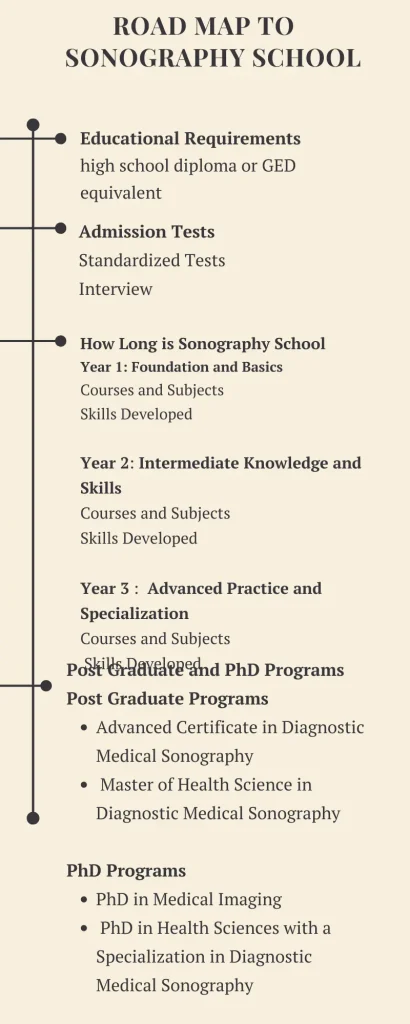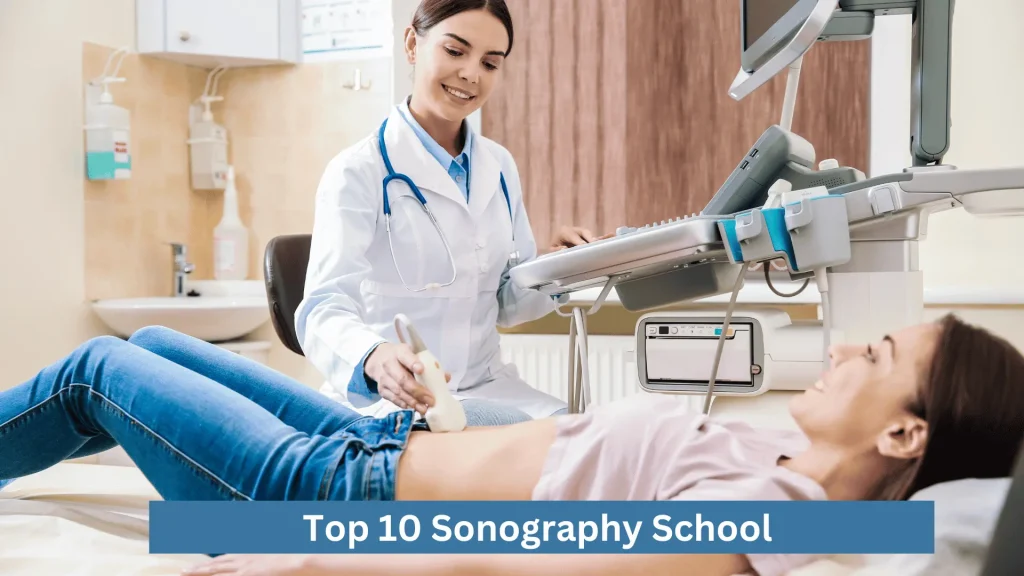How Long is Sonography School? The duration of sonography school varies depending on the program. Typically, an associate degree in sonography takes about two years to complete, while a bachelor’s degree may take four years. Certificate programs, which are often pursued by those already in the healthcare field, can be completed in 12 to 18 months.
What is Sonography School
Sonography school trains students to become skilled diagnostic medical sonographers, using ultrasound technology to create images of the body’s internal structures. These programs offer both theoretical knowledge and practical skills, preparing students for careers in hospitals, clinics, and other healthcare settings. With a focus on patient care and technical proficiency, sonography schools ensure graduates are well-equipped for this specialized field.

Sonography school provides comprehensive education in ultrasound technology, anatomy, and physiology. Students learn to operate sophisticated imaging equipment, interpret ultrasound images, and assist physicians in diagnosing medical conditions. Clinical internships are a crucial component, offering hands-on experience in real healthcare environments. Graduates are prepared for certification exams, a key step towards professional practice in the growing field of diagnostic medical sonography.
How Long is Sonography School
Here’s a detailed year-wise explanation of an undergraduate program for Sonography (Diagnostic Medical Sonography) School:
Year 1: Foundation and Basics
Courses and Subjects:
- Introduction to Sonography: Overview of the sonography field, roles of sonographers, and career opportunities.
- Medical Terminology: Understanding medical terminology used in healthcare and sonography.
- Anatomy and Physiology I: Basic understanding of human anatomy and physiological processes.
- Patient Care in Imaging: Basics of patient care, safety, and communication in a clinical setting.
- Physics of Ultrasound: Introduction to the principles of ultrasound physics and instrumentation.
Skills Developed:
- Basic understanding of sonography and healthcare terminology.
- Knowledge of human anatomy and physiology.
- Fundamental patient care skills.
- Basic principles of ultrasound physics.
Year 2: Intermediate Knowledge and Skills
Courses and Subjects:
- Anatomy and Physiology II: Continuation of the study of human anatomy and physiology.
- Abdominal Sonography I: Introduction to abdominal sonography, including techniques and pathology.
- Obstetrics and Gynecology Sonography I: Basics of sonographic imaging in obstetrics and gynecology.
- Vascular Sonography I: Introduction to vascular imaging and techniques.
- Pathophysiology: Understanding disease processes and how they affect sonographic imaging.
Skills Developed:
- In-depth knowledge of anatomy and physiology.
- Basic skills in abdominal, obstetrics, gynecology, and vascular sonography.
- Understanding of disease processes and their impact on sonographic imaging.
Year 3: Advanced Practice and Specialization
Courses and Subjects:
- Abdominal Sonography II: Advanced techniques and pathology in abdominal sonography.
- Obstetrics and Gynecology Sonography II: Advanced imaging techniques in obstetrics and gynecology.
- Vascular Sonography II: Advanced vascular imaging and pathology.
- Echocardiography I: Introduction to cardiac sonography, including techniques and pathology.
- Clinical Practicum I: Hands-on experience in a clinical setting, applying knowledge and skills in real-world scenarios.
Skills Developed:
- Advanced skills in abdominal, obstetrics, gynecology, and vascular sonography.
- Basic skills in echocardiography.
- Practical experience through clinical practicum.
Year 4: Professional Practice and Real-World Experience
Courses and Subjects:
- Echocardiography II: Advanced techniques and pathology in cardiac sonography.
- Musculoskeletal Sonography: Introduction to imaging of the musculoskeletal system.
- Breast Sonography: Techniques and pathology related to breast imaging.
- Clinical Practicum II: Continued hands-on experience in a clinical setting, focusing on advanced techniques and patient care.
- Sonographic Physics and Instrumentation: In-depth study of ultrasound physics and instrumentation, preparing for professional certification exams.
Skills Developed:
- Advanced skills in echocardiography, musculoskeletal, and breast sonography.
- Extensive real-world experience through clinical practicums.
- Preparation for professional certification exams in sonography.

HOW TO ENTER Sonography SCHOOL
Educational Requirements
High School Diploma or Equivalent
- Completion of high school or equivalent.
- Coursework in math, science (especially biology and physics), and English is often recommended.
Prerequisite Courses
- Completion of college-level courses in human anatomy and physiology, physics, medical terminology, and sometimes algebra.
- Some programs may require prior coursework in healthcare-related subjects.
Minimum GPA
- Most programs require a minimum GPA, typically around 2.5 to 3.0 on a 4.0 scale.
Entry Tests
Standardized Tests
- Some programs may require standardized test scores such as the SAT or ACT.
- Community colleges and technical schools may not require these tests.
Sonography-Specific Tests
- Some schools may require specific assessments or entrance exams to evaluate candidates’ aptitude for the sonography field.
- Tests might include sections on math, science, and medical terminology.
Application Process
Research Programs
- Identify and research accredited sonography programs that match your career goals.
- Look for programs accredited by the Commission on Accreditation of Allied Health Education Programs (CAAHEP).
Application Form
- Complete the application form for each program, which can often be found on the school’s website.
- Ensure all personal information and educational history are accurate.
Transcripts
- Submit official transcripts from high school and any college coursework.
- Ensure transcripts are sent directly from the institutions to the sonography school.
Letters of Recommendation
- Provide letters of recommendation from teachers, employers, or healthcare professionals.
- Recommendations should highlight your suitability for the sonography program and your work ethic.
Personal Statement
- Write a personal statement or essay explaining your interest in sonography and your career goals.
- Highlight any relevant experience or skills that make you a strong candidate.
Resume
- Submit a current resume detailing your educational background, work experience, and any relevant skills or certifications.
Interview
- Some programs may require an interview as part of the application process.
- Be prepared to discuss your interest in sonography, your educational background, and your career aspirations.
Financial Aid
Federal Financial Aid
- Complete the Free Application for Federal Student Aid (FAFSA) to determine your eligibility for federal grants, loans, and work-study programs.
- Federal Pell Grants, Direct Subsidized Loans, and Direct Unsubsidized Loans are common sources of aid.
State Financial Aid
- Check for state-specific grants, scholarships, and loan programs available to students in your state.
- State aid programs often have their own application processes and deadlines.
Institutional Scholarships and Grants
- Many schools offer scholarships and grants based on merit, financial need, or specific criteria such as academic performance or community service.
- Check the financial aid office of the schools you’re applying to for available opportunities.
Private Scholarships
- Look for scholarships from professional organizations, healthcare companies, and community groups.
- Websites like Fastweb, Scholarships.com, and the College Board’s Scholarship Search can help identify opportunities.
Employer Tuition Assistance
- If you’re currently working, check if your employer offers tuition assistance or reimbursement programs for continuing education.
Payment Plans
- Many schools offer payment plans that allow you to spread out tuition payments over the semester or academic year.
- Contact the bursar’s office at the school for more information.
Military Benefits
- If you’re a veteran or active-duty military, you may be eligible for educational benefits through the GI Bill or other military education programs.
Post Graduate and PhD Programs for Sonography School
Post Graduate Programs in Sonography
1. Advanced Certificate in Diagnostic Medical Sonography
- Duration: 1-2 years
- Focus: Provides specialized training in areas such as vascular sonography, musculoskeletal sonography, or advanced obstetrics and gynecology sonography.
- Admission Requirements: Bachelor’s degree in sonography or a related field, current certification as a diagnostic medical sonographer, and clinical experience.
2. Master of Health Science in Diagnostic Medical Sonography
- Duration: 2-3 years
- Focus: Advanced clinical practice, research, education, and leadership in sonography.
- Admission Requirements: Bachelor’s degree in sonography or a related healthcare field, current certification, and professional experience.
- Core Courses:
- Advanced Sonographic Techniques
- Health Policy and Management
- Research Methods in Health Sciences
- Clinical Practicum
3. Master of Science in Medical Imaging
- Duration: 2 years
- Focus: Specializations in areas such as cardiovascular sonography, pediatric sonography, or advanced neurosonography.
- Admission Requirements: Bachelor’s degree in sonography or a related field, certification, and clinical experience.
- Core Courses:
- Advanced Pathophysiology
- Imaging Modalities and Techniques
- Advanced Patient Care
- Clinical Research Methods
PhD Programs in Sonography and Medical Imaging
1. PhD in Medical Imaging
- Duration: 4-6 years
- Focus: Research, advanced practice, and academic careers in medical imaging and sonography.
- Admission Requirements: Master’s degree in sonography, medical imaging, or a related field, research experience, and a strong academic record.
- Core Courses:
- Advanced Imaging Techniques
- Biomedical Imaging Research
- Health Informatics
- Dissertation Research
2. PhD in Health Sciences with a Specialization in Diagnostic Medical Sonography
- Duration: 4-6 years
- Focus: Research and leadership roles in healthcare, advanced sonographic techniques, and technology development.
- Admission Requirements: Master’s degree in a relevant field, professional certification, and substantial clinical experience.
- Core Courses:
- Advanced Biostatistics
- Health Policy and Ethics
- Advanced Diagnostic Imaging
- Dissertation Research
Top 10 Sonography Schools
Here are ten highly regarded sonography (diagnostic medical sonography) schools in the United States, known for their comprehensive programs, accreditation, and strong industry reputation:

1. Johns Hopkins University
- Location: Baltimore, MD
- Highlights: Offers a highly respected sonography program through its School of Medicine, featuring state-of-the-art facilities and experienced faculty.
2. Mayo Clinic College of Medicine and Science
- Location: Rochester, MN
- Highlights: Renowned for its medical programs, Mayo Clinic offers a robust sonography program with extensive clinical training opportunities.
3. University of Washington
- Location: Seattle, WA
- Highlights: Offers a Bachelor of Science in Diagnostic Medical Sonography with excellent clinical rotation opportunities and strong research focus.
4. Oregon Institute of Technology (Oregon Tech)
- Location: Klamath Falls, OR
- Highlights: Known for its strong emphasis on hands-on training and high job placement rates for graduates.
5. University of California, San Diego (UCSD)
- Location: San Diego, CA
- Highlights: Offers a comprehensive sonography program through its UCSD Extension, including specialties in various sonography fields.
6. University of Iowa
- Location: Iowa City, IA
- Highlights: Provides a well-rounded sonography program with access to a top-tier medical center and diverse clinical experiences.
7. Rush University
- Location: Chicago, IL
- Highlights: Offers a Master of Science in Vascular Ultrasound, along with other advanced sonography programs, providing excellent clinical and research opportunities.
8. Thomas Jefferson University
- Location: Philadelphia, PA
- Highlights: Known for its strong healthcare programs, Thomas Jefferson offers a Bachelor’s and Master’s in Medical Imaging and Radiation Sciences with a focus on sonography.
9. University of Missouri
- Location: Columbia, MO
- Highlights: Offers a Bachelor of Health Science in Clinical and Diagnostic Sciences with an emphasis on sonography, featuring robust clinical training.
10. Nova Southeastern University
- Location: Fort Lauderdale, FL
- Highlights: Offers a comprehensive Bachelor’s and Master’s program in Medical Sonography, emphasizing both academic and clinical excellence.
Factors Affecting the Length of Sonography School
Several factors influence the length of sonography school, including:
Type of Program:
Certificate Programs: Usually 12 to 18 months, designed for those with prior healthcare experience.
Associate Degree Programs: Typically 2 years, combining general education with sonography-specific courses.
Bachelor’s Degree Programs: Usually 4 years, offering a more in-depth and comprehensive education.
Specialization:
Different specializations, such as cardiac, vascular, or abdominal sonography, may have varying requirements and duration.
Part-Time vs. Full-Time Enrollment:
Part-time students may take longer to complete the program compared to full-time students.
Clinical Rotation Requirements:
The extent and duration of required clinical rotations can impact the overall length of the program.
Prior Education and Experience:
Students with prior healthcare education or experience may be eligible for accelerated programs or advanced standing, reducing the time required.
Program Structure and Curriculum:
The specific structure and curriculum of the program, including the availability of courses and the sequence in which they are offered, can also affect the duration.
Final Verdict
Sonography school provides comprehensive training, varying in duration based on program type and specialization. With numerous prestigious institutions offering quality education, aspiring sonographers have excellent opportunities to excel in this vital healthcare field.
FAQs
1.How long does it take to complete a sonography program?
Certificate programs: 12-18 months, Associate degrees: 2 years, Bachelor’s degrees: 4 years.
2.What are the educational requirements to enroll in a sonography program?
High school diploma or equivalent, prerequisite courses in biology, physics, and mathematics, and a minimum GPA.
3.Are clinical rotations required in sonography school?
Yes, clinical rotations are essential for gaining hands-on experience in real healthcare settings.
4.What are the career prospects for sonography graduates?
Graduates can work in hospitals, clinics, and diagnostic imaging centers, with opportunities for specialization and advancement.
5.What financial aid options are available for sonography students?
Scholarships, federal and state grants, student loans, and work-study programs.
